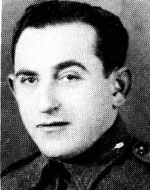Bekerman, Moshe (Mishka)
Son of Hannah and Gershon. Born in Pinsk, Poland, on April 4, 1922, the family immigrated to Israel and settled in Tel Aviv, where they spent two weeks in an immigrant home, and after receiving a tent from the Jewish Agency, they established it in the Shafak neighborhood “Habima” of the day.) Mishka began to study at the Alliance Israelite Universelle at the Jaffa border and made the journey back and forth on foot, and after a while the family moved to a hut on son of Yehuda Street and continued his studies at the Tel Nordoi Elementary School When he completed his studies, began helping the household agriculture, first as an assistant and studying construction work, and when he received a driver’s license – he was only 17 – he began to work as a driver A truck in the Litvinsky brothers’ orchards (today’s Tel Hashomer), Moshe volunteered for the Hagana organization and dedicated Meitav and Meirav with his energies and time, and even before that, during the 1929 riots, he served as a liaison between the Hagana positions adjacent to the Arab village of Sumil and Beit The Muslim Cemetery (today’s Independence Park). In 1932 Moshe was accepted into the “HaMa’avir” cooperative (the predecessor of Dan). He was appointed Hagana deputy in the Tel Aviv area. In his car was installed the underground transmitter of the Haganah and “Slik” installed in his car was moving weapons from place to place. He also set up a hidden weapons warehouse in his basement. At the outbreak of World War II, Moshe responded to the call of the institutions and enlisted as a driver for a Hebrew transport unit in the British army. At first, the unit served in Israel and in the Western Desert, and Moshe continued to work for the Hagana. When Greece was in danger of a German invasion, a British expeditionary force was sent to Greece to arrest the Germans, and Moshe’s unit was attached to this corps. The British army failed in its mission and many of its soldiers were forced to surrender. On May 17, 1941, Moshe was taken prisoner and on the same day he was wounded by German soldiers guarding the POW camp. He was laid to rest in a British military cemetery in Athens. He left parents, two brothers and a sister. All attempts by the family to bring his bones to Israel have so far failed. Moshe’s memory is mentioned in “The Book of Volunteerism,” in “The History of the Haganah,” in “The Book of the Press” and in the Yizkor book of the Jabotinsky Institute. BAYER, 5711. Location of Tomb 12B5 ROYAL ARMY SERVICE CORPS Rank Driver.
